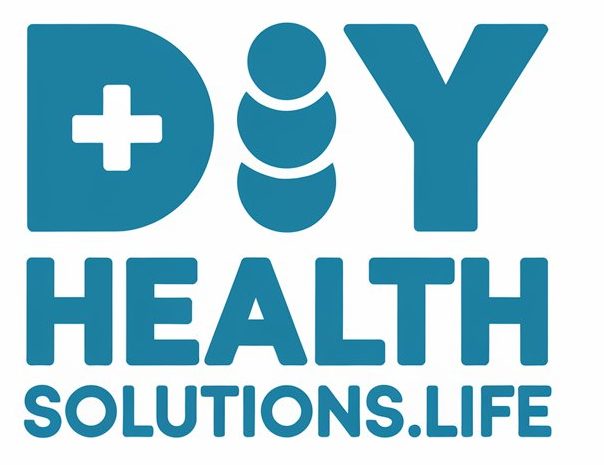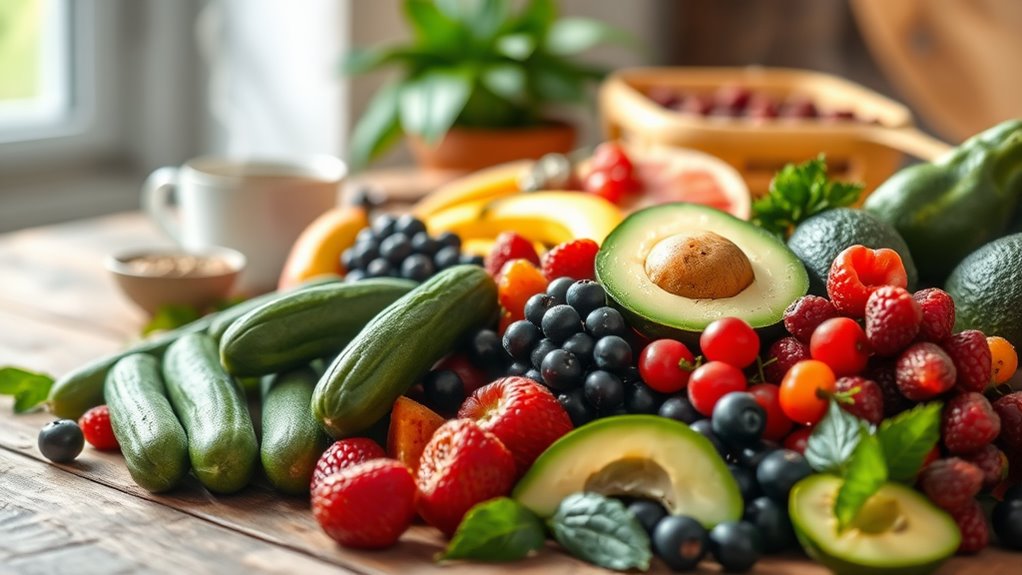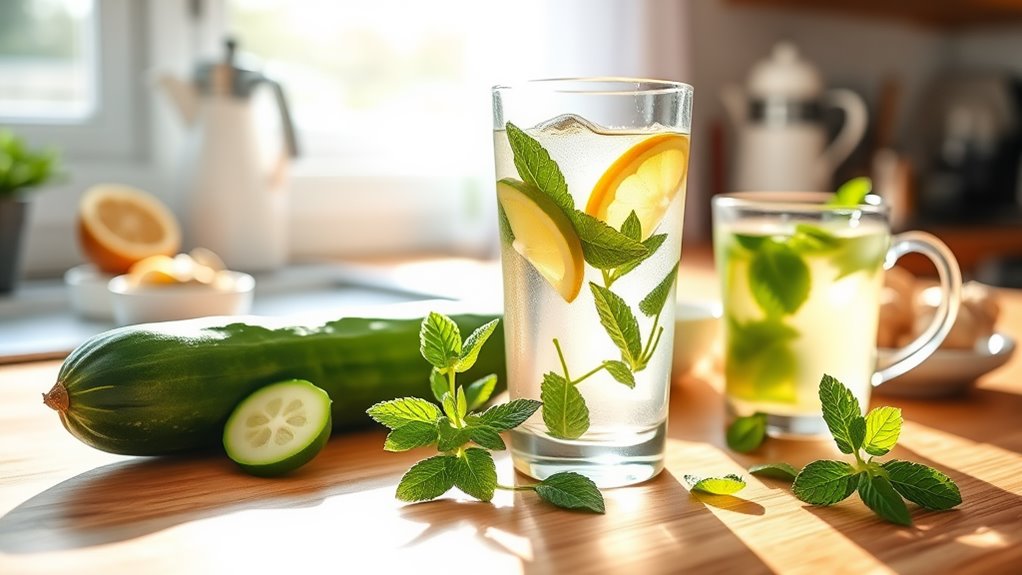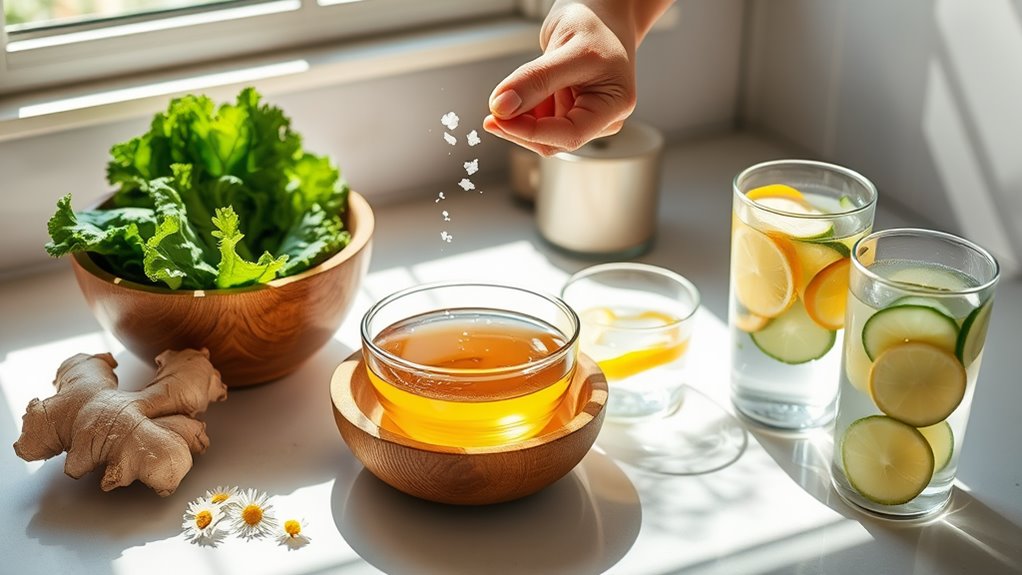Say Goodbye to Bloating With These Surprising Solutions!
Say goodbye to bloating with a few surprising tricks! First, sip on some herbal teas like peppermint or ginger—they’re fantastic for your tummy! Staying hydrated is super important too, so drink plenty of water. It helps flush out extra salt and keeps your belly feeling light. Don’t forget probiotics! Eating yogurt or taking a supplement can keep your gut happy. Gentle exercise, like a nice walk or some yoga, can also help. Lastly, try stress-busters like deep breathing or even some laughter; it really works wonders! Stick around, and you’ll discover even more helpful tips!
Understanding Bloating Causes
Bloating can be frustrating, and understanding its causes is essential for finding relief. You might feel like a balloon that’s about to pop, and that’s totally normal!
First, let’s talk about what causes this uncomfortable feeling. Often, it’s the food you eat. Certain foods, like beans, cabbage, and carbonated drinks, can create gas in your tummy. Who knew that your favorite soda could turn you into a human balloon?
Another reason for bloating could be swallowing air while you eat. If you’re in a hurry, you might be gulping down your food without even realizing it. Slow down, take a breath, and enjoy your meal.
Sometimes, it’s not just about food. Stress can also play a big role. When you’re anxious, your body can react in funny ways, making you feel bloated. Keeping calm might help your tummy settle down.
Lastly, food intolerances, like lactose intolerance, can leave your stomach feeling unhappy. It’s important to pay attention to how your body reacts to different foods.
Understanding these causes can help you tackle bloating and feel more comfortable. So, let’s explore some surprising solutions next!
Herbal Teas for Relief
When it comes to soothing an upset stomach, herbal teas can work wonders. They’re like a warm hug for your belly! Certain herbal teas can help reduce bloating and make you feel more comfortable.
Peppermint tea is a popular choice; it relaxes your digestive muscles and helps gas pass through. Imagine your tummy letting out a little sigh of relief!
Ginger tea is another fantastic option. Ginger has natural anti-inflammatory properties, which can ease that heavy feeling you might be experiencing. Plus, it adds a zesty kick that can brighten your day!
Chamomile tea is also great for calming an upset stomach. It’s gentle and soothing, making it perfect for those times when you need to unwind.
Just picture yourself curled up with a cozy blanket, sipping on chamomile, and letting your worries float away.
Probiotics and Gut Health
For centuries, people have turned to probiotics to support gut health and alleviate digestive discomfort. These tiny bacteria might sound scary, but they’re actually your gut’s best friends! Probiotics can help balance the good and bad bacteria in your digestive system, making you feel lighter and less bloated.
You can find probiotics in foods like yogurt, kefir, sauerkraut, and even some types of pickles. If you’re not a fan of these foods, don’t worry! Probiotic supplements are super popular and easy to take. Just pop a pill, and you’re on your way to better gut health!
When you include probiotics in your diet, you may notice improvements in your digestion. They can help break down food, absorb nutrients, and keep things moving smoothly.
Plus, they might even boost your immune system, making you feel more energetic and less sluggish.
Simple Breathing Techniques
You might be surprised to learn that simple breathing techniques can really help with bloating.
By practicing diaphragmatic breathing, timing your breaths right, and maintaining good posture, you can give your body a great chance to feel better.
Diaphragmatic Breathing Benefits
Many people overlook the power of diaphragmatic breathing, yet it can be a game changer for alleviating bloating. This simple technique helps you take deeper breaths, which can calm your body and ease that uncomfortable feeling in your tummy. You might be surprised at how effective it is!
Here are three benefits of diaphragmatic breathing:
-
Reduces Stress: When you breathe deeply, it signals your body to relax. Less stress means less bloating, as stress can wreak havoc on your digestive system.
-
Improves Oxygen Flow: Deep breathing helps your body get more oxygen. This boost can enhance your overall bodily functions, including digestion, which can help keep bloating at bay.
-
Strengthens Core Muscles: Diaphragmatic breathing also works your core muscles. A strong core supports your abdomen, which can aid digestion and reduce bloating.
Timing Your Breaths
Timing your breaths can significantly enhance the benefits of diaphragmatic breathing. When you breathe in and out at a steady rhythm, you help your body relax and release built-up tension.
So, let’s try a simple technique!
Start by inhaling deeply through your nose for a count of four. Picture filling your belly like a balloon, not just your chest. Then, hold that breath for a moment—about two counts. This pause isn’t just for fun; it helps your body absorb the oxygen.
Now, exhale slowly through your mouth for a count of six. Imagine you’re blowing out birthday candles; you want it to be gentle and steady.
Repeat this cycle a few times, and you’ll notice how much calmer you feel. You’re not only calming your mind but also easing any bloating. It’s like giving your tummy a little hug!
Posture and Alignment
Good posture plays a crucial role in effective breathing and can help alleviate bloating. When you sit or stand up straight, your lungs can expand fully, allowing for deeper breaths. This makes a big difference in how your body processes food and air.
So, let’s straighten up! Here are three simple breathing techniques you can try to improve your posture and reduce bloating:
-
Sit Tall: When you’re sitting, keep your back straight and your shoulders relaxed. Imagine a string pulling the top of your head toward the ceiling. This helps open up your chest and makes it easier to breathe.
-
Stand Strong: Stand with your feet shoulder-width apart and your weight evenly distributed. Engage your core muscles a little, and keep your chin parallel to the ground. This alignment helps your diaphragm work better.
-
Breathe Deeply: Inhale through your nose, filling your belly with air. Hold it for a moment, then exhale slowly through your mouth. Repeat this a few times, and you’ll feel more relaxed and less bloated.
The Power of Hydration
When you’re feeling bloated, it’s easy to overlook one of the simplest solutions: drinking enough water.
Staying hydrated helps your digestion work smoothly, and it can even make you feel less puffy.
Plus, sipping on herbal teas can add some extra flavor while giving your body the hydration it craves—who knew fighting bloating could taste so good?
Importance of Water Intake
Staying hydrated is crucial for managing bloating, as water plays a vital role in digestion and overall gut health. When you don’t drink enough water, your body can hold onto excess fluids, leading to that uncomfortable puffy feeling.
But don’t worry! Here are three reasons why you should grab that water bottle:
-
Flushes Toxins: Drinking enough water helps your body get rid of waste and toxins. Think of it as a little cleaning service for your insides!
-
Balances Sodium Levels: When you’re well-hydrated, it helps keep sodium levels in check. This can prevent your body from retaining excess water, which is a major culprit of bloating.
-
Promotes Regularity: Water is key for keeping things moving smoothly in your digestive system. If you’re feeling backed up, a tall glass of water might just do the trick.
Hydration and Digestion
Hydration plays a powerful role in digestion, and you might be surprised at just how much it affects your gut health. When you drink enough water, you’re helping your body break down food more effectively. Water acts like a superhero for your digestive system, making it easier for nutrients to be absorbed.
It also helps prevent constipation, which can be a major cause of bloating. Have you ever noticed that when you’re dehydrated, your stomach feels heavy and uncomfortable? That’s because a lack of water can slow down your digestion.
So, when you sip on that refreshing glass of water, you’re not just quenching your thirst; you’re giving your gut the support it needs. Plus, staying hydrated can help your body flush out toxins, keeping things running smoothly.
If you want to feel lighter and more energetic, make it a habit to drink water throughout the day. Just remember, your body loves hydration, so don’t skimp on it! The next time you reach for a snack, consider pairing it with a nice drink of water. Your belly will thank you!
Herbal Teas Benefits
If you’re looking for another way to boost your hydration and support digestion, herbal teas are a fantastic option.
These delightful brews not only taste great, but they also come packed with benefits that can help you say goodbye to that uncomfortable bloating. Plus, they’re super easy to make!
Here are three herbal teas you should definitely consider:
-
Peppermint Tea: This refreshing tea helps relax your digestive muscles, making it easier for gas to pass. It’s like a little party for your tummy!
-
Ginger Tea: Known for its warming properties, ginger tea can help soothe your stomach and reduce bloating. Plus, it tastes amazing—like a cozy hug in a cup!
-
Chamomile Tea: This calming tea doesn’t just help you relax; it also aids digestion and can ease gas. Sip it before bedtime, and you’ll be drifting off to dreamland in no time.
Foods to Avoid
Certain foods can significantly contribute to bloating, so it’s wise to be mindful of your diet.
First off, you might want to steer clear of beans. They’re packed with fiber, which is great, but they also contain sugars that can cause gas.
Next up, cruciferous veggies like broccoli and cauliflower are healthy, but they can make you feel like a balloon if you eat too much.
Dairy products can also be tricky. If you’re lactose intolerant, even a small amount of milk or cheese can lead to discomfort.
Let’s not forget about carbonated drinks! Those bubbles might be fun, but they can fill you up with air, making you feel puffy.
Processed foods are another culprit. They often contain high levels of sodium, which can make you retain water.
Lastly, watch out for artificial sweeteners. They might be in your favorite sugar-free snacks, but they can cause serious bloating issues.
Gentle Exercise Routines
After identifying foods that can cause bloating, it’s important to consider how gentle exercise can help alleviate discomfort.
You don’t need to run a marathon—just a little movement can make a big difference! Here are three gentle exercise routines that can help you feel better:
-
Walking: A simple stroll around your neighborhood or even in your living room can get things moving. Walking helps encourage digestion and can ease that bloated feeling.
-
Yoga: Certain yoga poses, like the “Child’s Pose” or “Knees to Chest,” can gently stretch your abdominal area. These stretches can help release trapped gas and make you feel more comfortable.
-
Light Stretching: Just a few minutes of light stretching at home can work wonders! Try reaching your arms overhead or bending side to side. You’ll feel your body relax, which can help ease bloating.
Mindfulness and Stress Reduction
Many people overlook the impact of stress on bloating, but managing your mind can significantly improve your gut health. When you’re stressed, your body can react in ways that lead to bloating and discomfort. That’s where mindfulness comes in! Practicing mindfulness helps you focus on the present moment, which can soothe your mind and body.
You might start by taking a few deep breaths. Inhale slowly through your nose, hold it for a moment, and then exhale through your mouth. Try doing this a few times whenever you feel stressed.
Another great idea is to find a quiet spot and spend a few minutes meditating. You don’t need to be a pro; just sit still, close your eyes, and pay attention to your breath.
Also, consider journaling your thoughts. Writing down what’s bothering you can help clear your mind and reduce anxiety.
Remember, laughter is a fantastic stress-buster too! So, watch a funny show or read a silly book.





